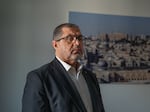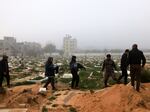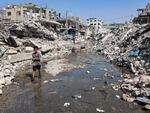
Basem Naim, a leader in the politburo of Palestinian militant group Hamas, photographed in Doha, Qatar, in July.
Claire Harbage/NPR
Hamas is willing to concede on governing the Gaza Strip after the war, but will not lay down arms against Israel, one of the group’s leaders says.
Basem Naim, a leader in Hamas’ politburo, met with NPR in Qatar for a wide-ranging interview about the war with Israel, prospects for a cease-fire deal and how the Palestinian group now views its Oct. 7 attack on Israel.
Palestinian militants used parachutes, speed boats and explosives to infiltrate Israel's border in the attack. Naim says Hamas was surprised by how quickly Israel's defenses crumbled.
Israel says around 1,200 people were killed that day. Another 250 people, including soldiers, were taken hostage.
Ordinary people from Gaza rushed across the border that Hamas had breached, leading to “a lot of chaos,” Naim says.
“Maybe this has led to some mistakes or had led to some steps which was not part of this operation,” he adds. “But at no time I would regret defending my dignity and freedom, regardless of the prices. We were living in a prison. And we have tried to knock the doors of this prison.”
Israel published body cam video footage that Hamas militants filmed during the operation. Scenes show hundreds of bodies at a music festival, the blood of people killed in their homes and terrified Israelis being dragged off to captivity.
Israel’s punishing retaliation upends life in Gaza
Gaza's Health Ministry says Israel's military retaliation — now in its 11th month — has killed more than 40,000 Palestinians, with thousands more unaccounted for. It says entire families have been buried under the rubble of Israeli airstrikes.
Israel says its military operations have been precise and targeted at Hamas. It blames Hamas for operating in civilian areas.
Gaza’s Health Ministry count does not distinguish between militants and civilians killed, but has identified most as women and children. The ministry has identified nearly 11,000 children among the dead.
"They are creating walls of blood, walls of aggression, which I am sure the next generation will not be ready to compromise on anything,” Naim says.

Mourners carry the bodies of Palestinian children Zein and Watin Saleh, killed along with the child Motaz Al-Mashukhi and his father Adel in an Israeli bombardment in Rafah, in the southern Gaza Strip, during their funeral on Feb. 9.
Mohammed Abed / AFP via Getty Images
“It is a matter of time. When is the next round [of fighting]? Unless they give us our genuine rights as Palestinians,” he says.
Some internally displaced civilians in Gaza have expressed anger not only at Israel for its offensive, but at Hamas’ leaders for not protecting them against Israel’s retaliation.
Naim says Palestinians have tried all means, peaceful and armed, to achieve an independent state.
Before the Oct. 7 attack, Jewish settlements were expanding alongside what Palestinians saw as growing encroachment in East Jerusalem, areas captured by Israel in the 1967 Mideast war. Arab governments, including the United Arab Emirates that has close ties with Israel, had been condemning lethal Israeli attacks on Palestinians in the West Bank, which had reached their highest levels in almost 20 years. A far-right government had taken power in Israel.
Naim says an entire generation of Palestinians was losing everything. “No vision, no horizon … no scenario that this will end soon.”
Related: Mediators hold new Gaza cease-fire talks and hope to head off a wider war
Hamas survives assassinations
Naim met with NPR on July 13 in Hamas’ office, in a villa in the suburbs of Qatar’s capital, Doha. The group’s presence there is part of a long-standing arrangement backed by the United States to keep a channel of communication open through Qatar as a mediator. The United States, European Union and Israel label Hamas a terrorist group.
Two weeks after Naim spoke with NPR, Hamas' top leader based in Qatar, Ismail Haniyeh, was assassinated during a visit to Iran.
Israel informed the U.S. it was behind his killing, a U.S. official told NPR on condition of anonymity in order to discuss details of the sensitive operation.
Hamas chose Yahya Sinwar, the group’s Gaza chief thought to have directed the Oct. 7 attack, as Haniyeh’s successor. It was seen as a message of defiance to Israel and the U.S., which has supported Israel with weapons throughout the war.
As part of Hamas’ top political leadership, Naim could also be targeted. Israel has vowed a worldwide manhunt to kill Hamas leaders.
Hamas says assassinations only harden support for the group, giving figures like Haniyeh the badge of martyrdom among supporters.
Founded as an Islamist Palestinian movement in 1987, Hamas has been governing Gaza since seizing control in 2007 and has fought multiple wars with Israel since then. The group has survived decades of high-profile killings.
“Hamas is a Palestinian national movement working for and struggling for the liberation of Palestine,” Naim says.
“It is an institution. It is not a one-man show."
Related: Israeli strike on Gaza school kills at least 80 people, Palestinian officials say
Hamas remains defiant even as it acknowledges losses
Israeli Prime Minister Benjamin Netanyahu insists on continuing the war in Gaza until Hamas' military and governing abilities are eliminated. He has also vowed to block the establishment of a Palestinian state, saying it would harm Israeli security.
Analysts say Hamas has been severely degraded from Israel’s punishing military campaign. Israel says it has dismantled nearly all of the group’s battalions in Gaza.
But Naim says the group cannot be eradicated. He says Hamas will not lay down arms — something Netanyahu has insisted must happen.
“Why not ask the other party to be this disarmed at the same level?” Naim says, referring to Israel. “We will be disarmed if you can guarantee that we will not be attacked.”
Experts say it will take years to rebuild Gaza and clear the munitions left behind by the war. Nearly all of Gaza's roughly 2 million residents are now displaced from their homes and most of the Gaza Strip's buildings, including schools and hospitals, have been damaged, according to the U.N.

A boy walks through a puddle of sewage water past mounds of trash and rubble along a street in the Jabalia camp for Palestinian refugees, in the northern Gaza Strip, on Wednesday.
Omar Al-Qattaa / AFP via Getty Images
In order to achieve a cease-fire deal that leads to international funds to rebuild Gaza, Hamas understands it must make concessions.
“We are not willing to come back to govern the Gaza Strip,” Naim says, though he doesn’t say for how long.
“What we are calling for is a Palestinian unity government, formed from technocrats who are not affiliated to any faction but supported from all factions … to run the situation in the Gaza Strip and the West Bank,” he says.
Palestinian rivals Hamas and Fatah, which has a bigger presence in the West Bank, struck a deal recently, with China as a broker, that calls for the creation of a unity government. It’s unclear when, or if, this will happen. The two factions fought one another for control of Gaza in 2007, leading to Hamas’ takeover of the territory and an Israeli-led blockade strictly controlling movement in and out of the enclave.
Hamas claims very costly wins against Israel
Naim says the Oct. 7 operation, which Hamas dubbed Al-Aqsa Flood, had several objectives, including to kidnap Israeli soldiers in exchange for Palestinian prisoners serving long terms.
Thousands more Palestinians have been detained throughout the war, however. Forty-four detainees from Gaza have died in Israeli military custody since the beginning of the war, according to a document the military provided to Physicians for Human Rights Israel and reviewed by NPR.
Naim says Israel’s image as a nation representing “Western values of human rights and democracy” has been shattered by the war. He says the war also showed Israel’s reliance on the United States, including in shooting down Iranian aerial strikes in April.
“I think yes, we have achieved a lot,” he says, before adding: “It is very costly. It is very expensive.”
Related: Hamas names Oct. 7 mastermind Yahya Sinwar as its new top leader
The German-educated surgeon, who once served as a minister of health and of youth and sports in Gaza, says Israeli airstrikes earlier this year killed his mother and grandchildren in Gaza.
“Anyone who has chosen this way of life, he is aware that he might pay some prices,” he says. “And I'm not more precious than all these children, including my children, my mother who has been killed.”
Unlike other Hamas leaders long in exile in Qatar, Naim had always been in Gaza.
He left Gaza shortly before the October attack for a meeting in Turkey, unaware of the operation’s timing, he says. Had he known, he says, he wouldn’t have left Gaza City, where his wife and children are struggling on their own.
Despite the unprecedented cost Palestinians have paid in Israel’s retaliation, Naim continues to defend Hamas’ decisions.
He says before Oct. 7, the world had been looking past the Palestinians, ignoring their plight. Another Arab country, Saudi Arabia, was inching closer to establishing formal relations with Israel.
“We were nearly deleted from the agenda of the region and international community,” he says. “I think today the situation is totally different.”
Abu Bakr Bashir contributed reporting from London.
Copyright 2024 NPR